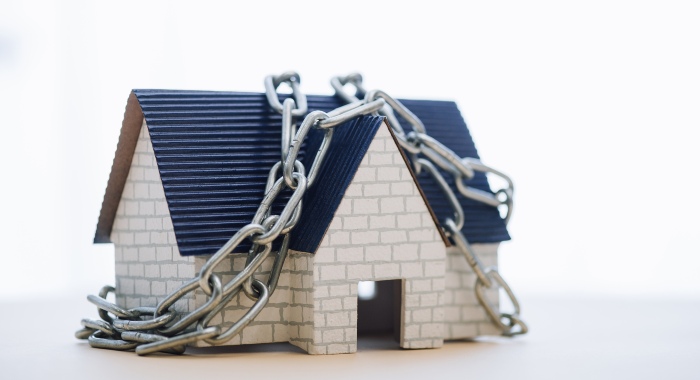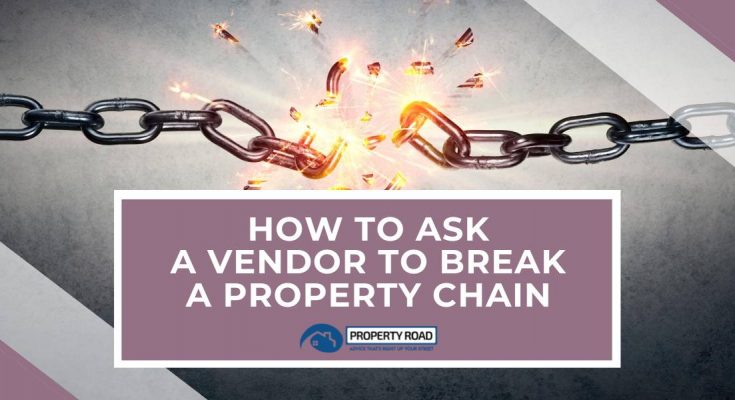Buying and selling a home in the UK can be a stressful experience that doesn’t always go well – but does it make sense to ask a vendor to break a property chain?
If there’s one thing that is potentially more stressful than selling or buying a home, is to do both at the same time.
Most people who move will be selling the home they live in and will be bidding on a home they want to buy.
It would be perfect if we could do both without any issues occurring and then move on the same day.
By doing so, you won’t have to rent somewhere else while waiting for the vendor to sell their home so you can organise moving in.
And being in a property chain can be stressful and expensive should the chain fall through.
What with non-refundable survey costs, solicitor fees as well as mortgage fees, obtaining your dream home can be a frustrating experience.
What is a property chain?
For those who have never been involved in a property chain, this is a term used to describe several properties with each sale depending on each other – much like a chain since they are all connected.
The buyers and sellers will be working together since a vendor is selling their home to the next person in the chain while buying a property from another vendor on the other side of the chain.
Put simply, a property chain starts with someone who is only buying a property without having to sell and will end with someone who is only selling their home.
Be aware that a property chain could just be two or three people long – or have more than 10! There is no limit to how long a chain could be.
Buying A Property? FREE Step-By-Step Platform
What can go wrong with a property chain?
It’s important to remember that a lot can go wrong with a property chain, particularly since one in four of these transactions, according to Which?, will fail.
Not only will the chain fail, but their survey revealed you could be out of pocket by £3,000 because of the fees you will still have to pay.
Also, the longer a chain becomes, your chance of it collapsing completely or facing a serious delay before moving into your new home, will grow.
And this is also the point – though an estate agent or conveyancing solicitor will also say the same thing – to appreciate that your property chain will only be as strong as the weakest link.
That’s regardless of how committed you may be to selling your property and buying another one.
It only takes one person in the chain to pull out of a sale, and the entire chain will fail.
The reasons why a property transaction in a chain will fail, include:
- A mortgage lender may decide not to lend because the criteria are not met, or the valuer may highlight a problem;
- A property survey may point to a big problem that leads to the buyer walking away;
- The survey may also highlight a small problem with the buyer demanding a reduction in price, if the seller refuses, the chain will fail;
- Someone in the chain may face financial hardship, for example being made redundant, and will be forced to leave the chain;
- A vendor may also struggle with personal circumstances, such as undergoing a divorce or bereavement, and they may also pull out of the chain;
- Gazumping: a growing issue once again is the problem of a third-party who is not involved in the chain offering a vendor more cash to buy their home – if they accept, then the chain will fail.
Part of the frustration when you become embroiled in a property chain is that there are so many issues that are out of your hands.
You can neither prevent nor predict what might happen to a chain, but you may be lucky and have a problem-free process to selling and buying your home, as does everyone else in that chain.
How to break up a property chain

Having mentioned that there’s little you can do to prevent or predict problems occurring within a property chain, you could make moves to break it up yourself.
One reason for doing so is that you will help minimise any risk of a chain failing when you really want to buy your dream home.
Or you may have simply become fed-up with the long wait for someone to find a buyer, and for someone else to find somewhere to buy.
Essentially, if you do break the chain, you will become more attractive to a vendor because you are chain-free which should then give you an advantage over other people wanting to buy the vendor’s home.
This means that you may have already sold your property and are renting until you find somewhere to buy.
This offers a greater chance of your transaction being completed – and reduces the risk of the chain failing.
Don’t forget, even if the chain consists of three or five buyers and sellers, that’s a lot of people and families, along with their finances, who need to work together and rely on property surveys and for mortgage lenders agreeing to a loan, for the chain to work.
How to become chain-free
In order to boost your appeal to a vendor, you will want to be chain-free because you may have already sold your home.
However, this process also boosts your attractiveness to someone looking to buy a property that is also chain-free.
They may be a cash buyer, or even a first-time buyer, and want to move quickly – and do not want to get involved in a long property buying chain.
This will result in fewer delays because you are simply dealing with one other party.
The benefits of becoming chain-free are obvious because you essentially become a first-time buyer.
That means you are ready to move, and you aren’t relying on others to buy or sell their homes in a chain.
Some estate agents will then refer to you as a ‘hot’ buyer.
Being ‘hot’ means you are a much safer bet for anyone wanting to sell – and even if you can’t quite match the seller’s asking price, your chances of buying a home are significantly boosted.
Asking a seller to break a property chain
This then brings us to the issue of asking a seller to break a property chain.
There are two issues here, and they are:
- You could boost your attractiveness to a vendor as being chain-free;
- You could ask the vendor to sell their property to you and ask them to move into rented accommodation – with you picking up the bill (or most of it).
This will, in turn, boost their attractiveness as a buyer in future.

Communication is key and you should discuss your plans with the vendor’s estate agent to see what the likely response might be.
Don’t forget too that if your vendor has been waiting to move and has grown fed-up, they may be interested in selling – and moving somewhere temporarily while their own vendor then moves out to their new home.
That’s because the estate agent has:
- Built-up a relationship with the vendor;
- Will be keen to get their commission from a sale.
It’s worth noting too that a survey from Rightmove shows that the number of properties being listed on their site as being chain-free grew from 15% in 2020, to 21% in 2021.
And in February 2021, the number of home buyers who were searching for somewhere to buy using the keyword ‘no chain’ was 72% higher than it was in the year before.
Remember too that if the vendor has spent a long time trying to find a buyer and is now stuck in a property buying chain, they may welcome an approach from you.
It’s certainly worth running the idea past their estate agent to get some feedback about how you and they can go about breaking a property chain.
Don’t forget that if you have a buyer lined up but their vendor can’t organise a completion to coincide with yours, you will have to:
- Consider moving into rented accommodation;
- Appreciate moving twice within a year – a big undertaking with a young family;
- You will need to spend money on rent;
- You could move in with family to save money on a temporary basis, though this might not be a practical choice.
You will still need to engage the services of a conveyancing solicitor and you will need a thorough survey done of the property.
Essentially, when it comes to asking a vendor to break a property chain, you need to be upfront and appreciate that you are asking the vendor to move out of a property that you want to buy – while they wait for their vendor to organise the selling of their home.
It may sound a tad cheeky to some people, but if you want to move and break the chain, you need a willing vendor and have the estate agent on your side – because if you don’t ask, you will never know!





